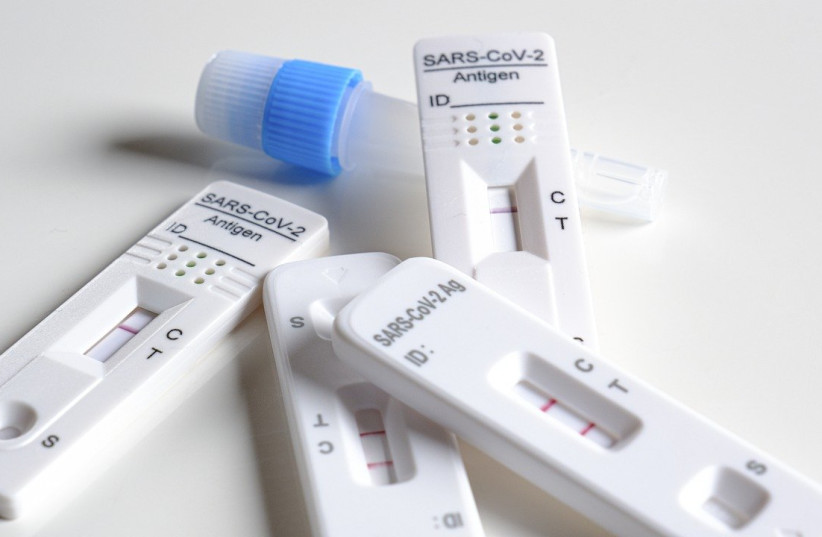WEAR YOUR MASK AVOID THE FLU
COVID-19 restrictions may have lowered mortality rates for other respiratory illnesses, says studyShould COVID-19 preventative measures prove to be effective in lowering numbers of other respiratory disease-related deaths as well, the burden placed on healthcare systems could be reduced.
By SHIRA SILKOFF
Published: MARCH 13, 2022

Cars line up at a drive-through COVID-19 testing center in Ganey Taaruha Tel Aviv, on January 3, 2022.
(photo credit: AVSHALOM SASSONI/FLASH90)
More than two years have passed since the start of the COVID-19 pandemic, and the requirement to wear face masks remains one of the most talked about public health measures.
As restrictions and requirements are rolled back across the world, and people begin to return to their old lives, a new study examined the impact face masks and other requirements had on respiratory illnesses besides COVID-19.
The study, which has yet to undergo peer review, was first published on March 11 by The Conversation website and was conducted by frontline healthcare workers in Canada.
The research group analyzed whether selective, non-mandated use of public health measures, including mask wearing and social distancing, should remain in place even though COVID-19 is no longer considered a pandemic.
Decreased demand for urgent-care services
At the start of the pandemic in March 2020, there was a dramatic decrease in the demand for urgent healthcare services, said lead author Rutvij A. Khanolkar, citing a June 2021 study from Alberta, Canada. The study found there were 94,059 hospital admissions and emergency-room visits in Alberta between March-September 2019, but that during the same time period one year later, there were 83,167.
The decrease in numbers originally was attributed to lockdown measures and the fear of entering a healthcare setting in a nonemergency situation. But the number of urgent-care visits for non-COVID-19-related respiratory diseases continued to decline even as public health measures were relaxed and other healthcare services reported an increase of patients.
Published: MARCH 13, 2022

Cars line up at a drive-through COVID-19 testing center in Ganey Taaruha Tel Aviv, on January 3, 2022.
(photo credit: AVSHALOM SASSONI/FLASH90)
More than two years have passed since the start of the COVID-19 pandemic, and the requirement to wear face masks remains one of the most talked about public health measures.
As restrictions and requirements are rolled back across the world, and people begin to return to their old lives, a new study examined the impact face masks and other requirements had on respiratory illnesses besides COVID-19.
The study, which has yet to undergo peer review, was first published on March 11 by The Conversation website and was conducted by frontline healthcare workers in Canada.
The research group analyzed whether selective, non-mandated use of public health measures, including mask wearing and social distancing, should remain in place even though COVID-19 is no longer considered a pandemic.
Decreased demand for urgent-care services
At the start of the pandemic in March 2020, there was a dramatic decrease in the demand for urgent healthcare services, said lead author Rutvij A. Khanolkar, citing a June 2021 study from Alberta, Canada. The study found there were 94,059 hospital admissions and emergency-room visits in Alberta between March-September 2019, but that during the same time period one year later, there were 83,167.
The decrease in numbers originally was attributed to lockdown measures and the fear of entering a healthcare setting in a nonemergency situation. But the number of urgent-care visits for non-COVID-19-related respiratory diseases continued to decline even as public health measures were relaxed and other healthcare services reported an increase of patients.

COVID-19 rapid antigen test (credit: PIXABAY)
The research group then widened its analysis to include admissions data across all of Canada. The collected data showed that hospital admissions for major respiratory illnesses dropped sharply in the year following the start of the first lockdown.
“Specifically, flare-ups of chronic obstructive pulmonary disease (COPD), a severe lung disease related to long-term smoking, and community-acquired non-COVID-19 pneumonia decreased by nearly 40 percent across Canada” following the introduction of mask requirements and social distancing, Khanolkar wrote.
An additional research paper published last August examined the hospital admissions data from across nine different countries and corroborated these results, showing a 50% reduction in COPD admissions after the onset of the pandemic.
A reduced burden on healthcare systems
According to a 2017 report published by the Forum of International Respiratory Societies, around three million people worldwide die of COPD every year, making it the third-leading cause of death globally.
Should COVID-19 preventative measures prove to be effective in lowering numbers of other respiratory disease-related deaths as well, the burden placed on healthcare systems could be significantly reduced.
Therefore, it might be beneficial for public officials to take these statistics into account before dispensing with COVID-19 measures entirely, the report said.
“The fact that hospitalizations for non-COVID-19 respiratory illnesses have remained low, despite the relaxation of stringent lockdown measures, suggests that these benefits may be sustained with the use of masking and practices such as frequent hand-washing,” Khanolkar wrote.
However, the research currently available surrounding the subject is minimal and largely observational, he said. Further studies would need to be conducted through randomized trials to get a clearer picture of the impact COVID-19 restrictions have on other respiratory illnesses, he added.
“It’s also unknown whether reductions in acute care use have translated into a reduction in mortality rates for specific conditions,” Khanolkar wrote.
Further research
To this end, a research group has begun addressing the limitations of the observational study.
A study of more than 500,000 patients is currently underway, the preliminary results of which will be presented at the 2022 American Thoracic Society International Conference in May. The available data from the study has indicated that preventative measures, such as face masks, are proving to be an effective strategy for preventing both urgent-care visits and respiratory illness-related mortality.
“Recommendations, policies or, if deemed necessary, mandates can be amended in the future as new evidence emerges,” Khanolkar wrote. “Until then, [mask] use, even on an interim basis, may reduce the strain on our healthcare system and help protect the most vulnerable members of our society.”
The research group then widened its analysis to include admissions data across all of Canada. The collected data showed that hospital admissions for major respiratory illnesses dropped sharply in the year following the start of the first lockdown.
“Specifically, flare-ups of chronic obstructive pulmonary disease (COPD), a severe lung disease related to long-term smoking, and community-acquired non-COVID-19 pneumonia decreased by nearly 40 percent across Canada” following the introduction of mask requirements and social distancing, Khanolkar wrote.
An additional research paper published last August examined the hospital admissions data from across nine different countries and corroborated these results, showing a 50% reduction in COPD admissions after the onset of the pandemic.
A reduced burden on healthcare systems
According to a 2017 report published by the Forum of International Respiratory Societies, around three million people worldwide die of COPD every year, making it the third-leading cause of death globally.
Should COVID-19 preventative measures prove to be effective in lowering numbers of other respiratory disease-related deaths as well, the burden placed on healthcare systems could be significantly reduced.
Therefore, it might be beneficial for public officials to take these statistics into account before dispensing with COVID-19 measures entirely, the report said.
“The fact that hospitalizations for non-COVID-19 respiratory illnesses have remained low, despite the relaxation of stringent lockdown measures, suggests that these benefits may be sustained with the use of masking and practices such as frequent hand-washing,” Khanolkar wrote.
However, the research currently available surrounding the subject is minimal and largely observational, he said. Further studies would need to be conducted through randomized trials to get a clearer picture of the impact COVID-19 restrictions have on other respiratory illnesses, he added.
“It’s also unknown whether reductions in acute care use have translated into a reduction in mortality rates for specific conditions,” Khanolkar wrote.
Further research
To this end, a research group has begun addressing the limitations of the observational study.
A study of more than 500,000 patients is currently underway, the preliminary results of which will be presented at the 2022 American Thoracic Society International Conference in May. The available data from the study has indicated that preventative measures, such as face masks, are proving to be an effective strategy for preventing both urgent-care visits and respiratory illness-related mortality.
“Recommendations, policies or, if deemed necessary, mandates can be amended in the future as new evidence emerges,” Khanolkar wrote. “Until then, [mask] use, even on an interim basis, may reduce the strain on our healthcare system and help protect the most vulnerable members of our society.”
No comments:
Post a Comment